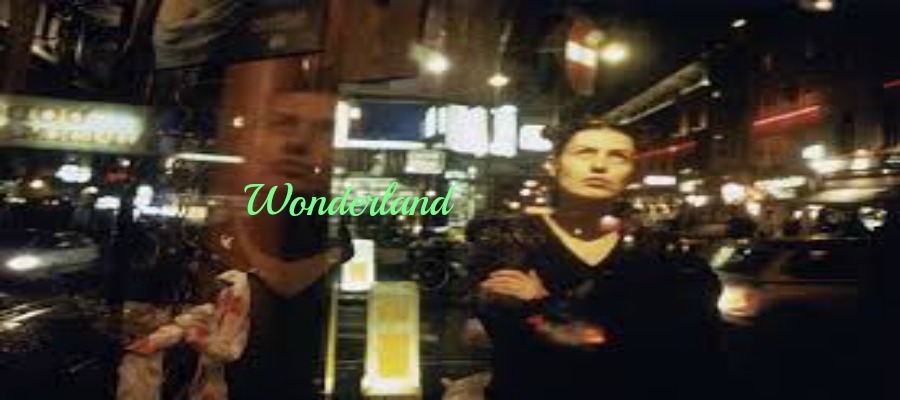Possibly the pinnacle of Nicolas Roeg's golden period of filmmaking, "Walkabout" is based on a novel by James Vance Marshall, and concerns a young brother and sister who find themselves stranded in the Australian outback. The female (played by Jenny Agutter) is a 16 year old schoolgirl whose younger brother ( played by the director's 7 year old son Luc) initially seems to take their new surroundings in his stride. Soon, the siblings encounter a young Aboriginal boy (David Gulpilil), sent out by his tribe on'walkabout'; a ritual that dictates an individual must leave his home and attempt to live off the land. The difference in cultures is somewhat offset by Luc Roeg's character who uses the international language of sings and gestures to communicate an urgent need for water, and a pattern emerges.

In essence, this is a coming-of-age tale, embroidered by themes of identity, dislocation of time and decay, mixed in with growing sexual tension between the two elders. Accompanied by a gorgeous John Barry score, Roeg's film is quite beautifully shot, taking in harsh terrain and beautiful scenery to stunning effect. There are so many iconic scenes and images here, and the script is equally as strong, leading us on an unforgettable journey that ends exquisitely. The 16 year old Agutter - chosen for the role 2 years earlier - is perfect as the youngster on the verge of adulthood, while Gulpilil cuts and imposing, haunting figure whoser mating ritual late in the film leads to tragedy. Of course, Roeg's son must also take credit as the young boy who must face a trial that many adults would find beyond them. Roeg's masterly use of editing, zooms, fades and painterly eye for capturing the great outdoors so beautifully make this a veritable feast for the eyes, and the themes employed here add a vast amount to the lasting appeal of this film.

Second Sight's Blu-ray presentation employs a brand new 4K scan and restoration that delivers sumptuous image quality, with glorious orange sunsets, verdant greens and vivid skintones. The supplemental features begin with a new audio commentary track with Luc Roeg and David Thomson. David takes the mic for the lion's share of the talk, recalling the film received a AA rating for its UK release; discusses the source novel (which may have been written by Donald Payne, rather than Marshall); compares "Walkabout" with Nicolas Roeg's "The Man Who Fell To Earth"; tlaks about the movie-going experience then and now and turns the spotlight on Nic's inspirations from various works of art. Overall, Luc has excellent recall of the shoot and talks about how his late father evolved with technology. I think Luc was enjoying watching this film again, admiring his father's craft while at the same time feeling emotional at seeing his younger self all those years ago
Producing Walkabout: an interview with Si Litvinoff (10m 7s) Si shares fond memories of what he terms Nic Roeg's "masterpiece", recalling how he met the director and became involved and talks about "A Clockwork Orange".
Luc's Walkabout: an interview with Luc Roeg (11m 9s) Luc discusses the shoot and talks about his admiration for David and Jenny.
Jenny And The Outback: an interview with Jenny Agutter (19m 20s) Jenny recalls her first meeting with Nicolas Roeg when she was 14, and how she joined the cast 2 years later, and goes into the ingredients that make Roeg's films so enduring.
Remembering Roeg: an interview with Danny Boyle (18m 31s) Danny explains why he has such a very high regard for the late director; how Roeg employed the unused potential of cinema and why "Walkabout" still comes across as a radical, modern film.
011 BFI Q&A with Nicolas Roeg, Jenny Agutter and Luc Roeg (16m 55s) Recorded at London's NFT on 5th March 2011, Nic talks about how he raised the finance for his film; Jenny recalls how she got the role and the trio remember the considerable contribution of David Gulpilil.
Archive Introdction By Nicolas Roeg (3m 54s) The director discusses the initial short script and how it evolved. Second Sight's Blu-ray package also includes the source novel, with cover art exclusive to this release. There's also a soft cover book featuring facsimilie copy of the original 65 page script with a preface by Daniel Bird, and a soft cover book with new essays by Sophie Monks Kaufman, Simon Abrahams and Daniel Bird, plus stills and lobby card images(none of which I've seen to date). Second Sight's disc is Region B, and will be released on 27th July. An essential purchase for Roeg buffs and indeed for newcomers to his work who like to be challenged by a director at the top of his game.


.jpeg)




